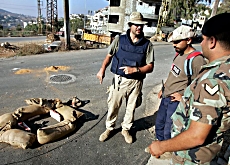Lebanon aid meeting to help shattered country

Sixty governments and organisations, including Switzerland, are taking part in a major fundraising effort on Thursday to help cover Lebanon's recovery needs.
The donors’ conference in Stockholm hopes to raise $500 million (SFr615 million). A separate meeting is scheduled for Friday on the humanitarian situation in the Palestinian territories.
After one month of hostilities, the lives of many Lebanese and their economy lie in tatters. Israeli air strikes destroyed more than 80 per cent of infrastructure in southern and eastern regions.
About 500,000 Lebanese are now dependent on emergency aid, including many who fled the bombing and are returning to their towns and villages, according to Jakob Kellenberger, president of the International Committee of the Red Cross (ICRC).
The Swiss government gave the ICRC SFr5.2 million in July for relief work. It spent an additional SFr2.4 million evacuating Swiss nationals from Lebanon.
At last week’s regular meeting the cabinet decided to wait and see what came out of the Stockholm conference before rubber-stamping a request by Foreign Minister Micheline Calmy-Rey for an additional SFr15 million for emergency aid. It promised that any contribution would be “targeted and intended to cover humanitarian needs”.
Catastrophic
The four-week long war has had disastrous consequences for Lebanon. More than 1,000 Lebanese died in the Israeli offensive, others were killed after the August 14 ceasefire, including victims of unexploded cluster bombs.
An estimated one million people were forced to flee their homes.
At the beginning of August the Lebanese Council for Development and Reconstruction (CDR) estimated the total damage at around $2.5 billion, of which $1.4 billion for destroyed homes.
The CDR said the war caused some $785 million in damage to vital infrastructure: bridges and roads, airports, electricity plants, distribution networks, telecommunications, water and sewerage systems, and oil storage plants.
The bombing of Jiyeh power plant in southern Lebanon resulted in 15,000 tons of oil spilling into the sea and a 150-km oil slick along the coastline.
On the edge
It took Lebanon 15 years to get its economy back on its feet after the end of the Lebanese civil war at the beginning of the 1990s.
The recent upturn has been driven by tourism, with a record number of visitors in 2004 – 1.3 million – especially from rich Gulf states; however, the war has stopped the industry in its tracks.
Arab investors from the Gulf region, who helped finance Lebanon’s construction and tourism booms, are now pulling out their money and investing in more stable countries.
The Lebanese Prime Minister Fouad Siniora describes recent events as the “worst economic damage in the country’s recent history”.
The CDR claims that the latest devastation cannot be compared with the damage caused between 1975-1991 during the civil war. Fighting was then limited mainly to small groups, while the recent Israeli offensive was aimed at systematically destroying Lebanon’s infrastructure.
With public debt standing at $35 billion, the country is now teetering on the edge of a precipice, says the CDR.
“It is extremely important that we show solidarity with Lebanon,” said the Swedish Foreign Minister Jan Eliasson who is hosting the Stockholm meeting.
swissinfo, Jean-Michel Berthoud
On July 18 Foreign Minister Micheline Calmy-Rey confirmed Switzerland’s support to Lebanese Prime Minister Fouad Siniora.
Switzerland has given the ICRC SFr5.2 million ($4.3 million) for relief work in Lebanon.
The country has also sent 800 kilograms of medication and seven tons of supplies, along with a dozen humanitarian specialists.
The Swiss foreign ministry’s Agency for Development and Cooperation (SDC) has shifted much of its humanitarian aid effort to southern Lebanon to assist returning refugees.
The ICRC said it aims to supply at least 200,000 internally displaced people and vulnerable residents in Lebanon with food and other items by the end of the year.
It aims to deliver drinking water to one million people and support health structures used by 600,000 people.
For 2006 the SDC’s projected budget for the Palestinian territories is SFr21.6 million.
Swiss Solidarity, the fund-raising arm of the Swiss Broadcasting Corporation, is raising money to help child victims in the Middle East. Donations can be made online (see link below) or to Post Office account: 10-15000-6, marked “Child victims of war”.

In compliance with the JTI standards
More: SWI swissinfo.ch certified by the Journalism Trust Initiative











You can find an overview of ongoing debates with our journalists here . Please join us!
If you want to start a conversation about a topic raised in this article or want to report factual errors, email us at english@swissinfo.ch.